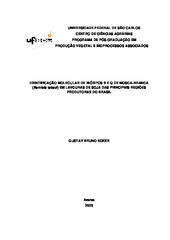Identificação molecular de biótipos b e q de mosca-branca (Bemisia tabaci) em lavouras de soja das principais regiões produtoras do Brasil
Abstract
Brazil is the major soybean producer in the world and one of the main insect pests, causing major economic losses is Bemisia tabaci, commonly known as whitefly. This pest causes damages which are related to its feeding on the phloem and transmission of virotic diseases. The whitefly is classified in biotypes, which are individuals morphologically identical but molecularly distinct. Thus, the objective of this work was to investigate B. tabaci B and Q biotypes in the main soybean growing regions in Brazil using PCR-specific primers for each biotype. To this end, 122 whiteflies populations were collected, and 2,928 individuals were analyzed during 2020, 2021 and 2022 soybean seasons. These populations were collected from seven Brazilian states: Bahia, Distrito Federal, Goiás, Mato Grosso, Mato Grosso do Sul, Minas Gerais e Paraná. The B biotype was predominant in all sampled soybean fields. The Q biotype was identified only in the Mato Grosso do Sul (2 individuals), Minas Gerais (3 individuals), and Paraná (5 individuals). To our knowledge, this is the first time the Q biotype is identified in soybean in the Mato Grosso do Sul state.
Collections
The following license files are associated with this item:

